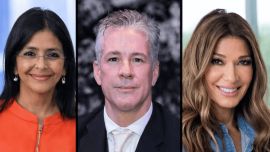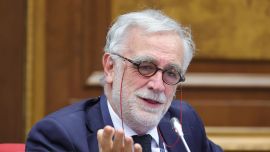President Alberto Fernández and visiting German Chancellor Olaf Scholz on Saturday called for the swift renegotiation and approval of the free-trade agreement between the European Union and the Mercosur bloc.
Speaking during a visit to Buenos Aires, Scholz said both leaders wanted a “rapid conclusion” to talks over the deal, which has been stalled for years.
"We agree on deepening bilateral trade relations and for this the EU-Mercosur agreement is of particular importance. Our objective is to reach a rapid conclusion" to the negotiations, Scholz told the press after the meeting.
Fernández, in turn, voiced the objections of both his nation and those of Brazil to Scholz, whilst underlining that both nations want “once and for all” to “finalise" the EU-Mercosur agreement.
After the return to power of allied leader Luiz Inácio Lula da Silva Lula in Brazil, the Mercosur “is in a better position" to reach an agreement, said Argentina’s president.
Scholz's tour of Latin America will take him in the coming days to Chile and Brazil. He is set to become the first leader of a major Western power to meet with Lula since he took office on 1 January.
Germany, Argentina's main trading partner in the European Union with bilateral trade of around US$3.6 billion in 2022, is interested in the development and export of renewable energies and in lithium production.
After the meeting, the two countries signed a memorandum of understanding regarding the transition to clean energy and a letter of intent to strengthen cooperation in the area of start-ups and the knowledge economy.
Scholz’s next stop will be Chile, where he will visit the Museum of Memory and Human Rights with President Gabriel Boric. The site remembers the atrocities and crimes against humanity committed during the dictatorship of Augusto Pinochet (1973-1990).
The German chancellor’s visit to Brazil on Monday is much anticipated after relations between the two nations deteriorated under the administration of Lula’s predecessor in office, far-right former president Jair Bolsonaro (2019-2022).
The last visit by a German head of government to Brazil took place in 2015, when then-chancellor Angela Merkel met Brazilian president Dilma Rousseff in Brasilia.
EU-Mercosur deal
The trade agreement between the EU and Mercosur trade bloc (Argentina, Brazil, Paraguay and Uruguay) is topping the agenda of Scholz’s tour. This agreement was sealed in 2019 after 20 years of negotiations, but has not yet been ratified and has been the subject of strong criticism in European and Latin American countries.
Agricultural sectors and environmental movements in the EU question in particular the sourcing of products resulting from the deforestation of the Amazon rainforest, which Lula has vowed to reverse since his return to power earlier this month.
This week, Lula declared in Uruguay that he considers the conclusion of the agreement to be an "urgent" priority.
The feeling is echoed by Germany's industrial sectors, which see the continent as a promising market. The powerful German machine tool manufacturers' federation has called for the agreement to be "finally implemented after years of going nowhere,” warning that “time is pressing.”
German companies are looking for business opportunities in the wake of the turbulence in raw material supplies caused by the Russian invasion of Ukraine.
During a press conference on Saturday, Fernández reiterated his desire to Scholz that "Argentina wants to become a secure supplier of gas to the world, also lithium and green hydrogen.”
Focus on environment
Environmental protection will be another key theme of the German chancellor's tour, especially during the visit to Brazil.
Following Lula's election victory on 30 October, Germany announced that it will resume its contributions to the Amazon Rainforest Conservation Fund that it had frozen during Bolsonaro's presidency, with a first payment of 35 million euros due imminently.
"Bolsonaro's government promoted a rupture in Brazilian environmental policy, it closed the doors of environmental diplomacy," Roberto Goulart Menezes, of the Institute of International Relations at the University of Brasília, told AFP.
"The Lula government, on the other hand, has taken up this agenda and made it one of its priorities," he added.
Pressure on Ukraine
While in Buenos Aires, Scholz discussed the war in Ukraine. German government sources anticipated in advance of the trip that the chancellor would seek to persuade South American countries to lean in favour of Kyiv.
Argentina, Brazil and Chile have all condemned Russian aggression, although they have been reluctant to impose sanctions on Moscow.
After expressing his "concern" over the Russian occupation and calling for an "end to hostilities," Fernández said Saturday that "Russia must understand the harm it is causing the world" with the invasion.
The Peronist leader said he hoped "that peace will be restored as soon as possible," though he assured that neither Argentina nor any nation in the region "is thinking of sending armaments" to Ukraine.
Lula caused a stir last year when he claimed that Ukrainian President Volodymyr Zelenskyy was "as responsible as [Russian President Vladimir] Putin" for the conflict.
Scholz will on Monday travel to Brasília, where he is due host a summit between Europe's largest economy and Latin America's largest.
– TIMES/AFP


























Comments